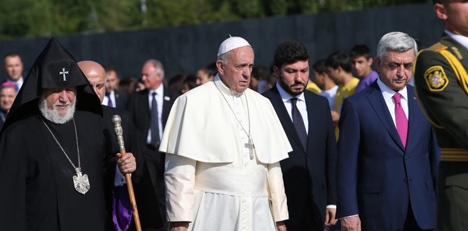
Pope Francis, the spiritual leader of the Roman Catholic Church, made an official visit to Armenia between 24 and 26 of June. During this visit, the Pope held high-level meetings with both political and religious leaders of Armenia. The officially stated goal of the Pope’s visit to Armenia was to show “affection and gratitude” towards Armenia and the Armenian people. However, gathering from what was said and done during the visit, the primary reason for Pope’s visit to Armenia was actually about bolstering ecumenism (solidarity and unity amongst Christians).
There is no surprise in this, as the drive for ecumenism has been a consistent theme of Pope Francis ever since he assumed his current position as the head of the Roman Catholic Church. Pope Francis sees a fractured Christianity that is unable to cope with the challenges and ills of today’s world, and thus desperately seeks ways to bring together the Catholic, Orthodox, and Protestant Christians of the world, preferably under the moral leadership of the Roman Catholic Church. In connection to this, the Pope heavily involving himself in the genocide narrative about the 1915 events (which was conspicuously raised during his visit), deserves to be understood within the context of his push for ecumenism.
The drive for ecumenism during the Pope’s visit was most apparent during the jests displayed by Pope Francis and Karekin II of the Armenian Apostolic Church[1] and through the signing of a joint declaration between these two religious leaders:[2]
We gladly confirm that despite continuing divisions among Christians, we have come to realize more clearly that what unites us is much more than what divides us. This is the solid basis upon which the unity of Christ’s Church will be made manifest, … Over the past decades the relationship between the Armenian Apostolic Church and the Catholic Church has successfully entered a new phase, strengthened by our mutual prayers and joint efforts in overcoming contemporary challenges. Today we are convinced of the crucial importance of furthering this relationship, engaging in deeper and more decisive collaboration not only in the area of theology, but also in prayer and active cooperation on the level of the local communities, with a view to sharing full communion and concrete expressions of unity. …
Such moves and statements represent another example of how Pope Francis is trying to appeal to Orthodox Christians. In the past, similar messages of solidarity were expressed when Pope Francis held meetings with Bartholomew I of the Greek Patriarchate of Istanbul and Patriarch Kirill of the Russian Orthodox Church. The Armenian Apostolic Church is another high-profile Orthodox church with which cultivating close relations will mean cultivating close relations and thus ecumenism with Orthodox Christians in general. The Pope had already delighted Armenians with his genocide remark last year and his visit to the “genocide museum” in Yerevan this year only furthered that delight. In an attempt to temper Turkish sentiments, the Pope and the Church took an unusual step this year with the commemoration of Taha Carım, the Turkish Ambassador to the Vatican who had been assassinated by Armenian terrorists in 1977.[3] However, the Pope’s deviation from the prepared text of a speech during his visit and his insistence on repeating the self-proclaimed genocide accusation showed once again a preference for vanity over principal.
It can be gathered from such a decision that Pope Francis’ drive to attain ecumenism is so great that he is willing to antagonize Turkey in an effort to fully appease Armenians (since what they want more than anything else is for others to use the genocide term). What we see here is basically the following agreement the Pope and the Armenian Apostolic Church; the Pope will throw his weight behind the genocide narrative, and in return, the Armenian Apostolic Church will fully back the Pope’s efforts to forge ecumenism under the leadership of the Roman Catholic Church.
As a justification for indulging in the genocide narrative, the Pope indicated that he had always used the genocide term in describing the 1915 events, and wished to be consistent in his usage. He reiterated his vague understanding[4] of what genocide is by referring to what he thinks are the three main genocides: “the Armenian, … that of Hitler, and the … that of Stalin (it is not clear what he means when referring to Stalin)”, while making a nonspecific reference about a genocide in Africa. Was he referring to the Rwandan Genocide? If so, why was he being so nonspecific about a court-proven case of genocide, almost as if it was not that important?
Most importantly, he again made absolutely no mention of the Srebrenica Genocide.[5] It is easy to see why he fails to make a mention of the Srebrenica Genocide: any sort of commemoration of this genocide upsets the Serbs and the Russians (both of which are predominantly Orthodox Christian people), who consider such commemorations as being provocative.[6] Being so keen on forging ecumenism, the Pope most probably chooses to steer clear of the Srebrenica Genocide in order avoid upsetting the Serbs and the Russians and thus risk losing the support of two prominent Orthodox peoples.
Finally, supposedly being so interested in pursuing justice and drawing attention to genocides, the Pope made absolutely no mention of the systemic massacres against the Herero and the Nama tribes by the German colonial administration during 1904-1907 in what is now Namibia, which people in Namibia and even some people in Germany deem to be a genocide.
All these examples go to show yet again that the Pope lacks a proper of understanding of what genocide is and cherry-picks historical topics that suit his own interests.
Both the Pope and the Roman Catholic Church were quick to defend the Pope’s actions during his visit to Armenia. The Pope indicated that he had no “offensive intention” during his use of the genocide term, and that Turkey has to right to protest against his use of this term.[7] Meanwhile, the Church strongly denied Turkey’s accusation that the Pope’s actions showcase the “mentality of the Crusades”, arguing that the Pope has no hostility towards Turkey.[8]
It is true that Pope has not exhibited any behavior that would overtly showcase that he is Turchophobic or Islamophobic. However, the genocide narrative has, during the course of a century, been crafted based on propaganda and distortions that derive their power from the Islamophobia and Turchophobia deeply entrenched in the psyche of (pre-dominantly Christian) Western countries. And as such, whether he admits it or not, the Pope’s use of the genocide narrative is furthering the stigmatization of Turks and turning them into a convenient sacrifice through which ecumenism may be forged.
In fact, abusing Turks in such a manner for the sake of ecumenism during Pope Francis’s reign started when the Roman Catholic Church collectively canonized the Christians who died during the Ottoman Empire’s Otranto Expedition back in 1480, despite the fact that the stories surrounding the expedition are steeped in vagueness, exaggerations, and biases.[9] Stories of the Otranto Expedition and the “Armenian genocide” conjure up the images of defenseless Christians being preyed on by an overbearing adversary (in this context, the Muslim Turks), which will induce Christians to look at the past and the present challenges and seek solidarity to defend their interests.
In a time when the Roman Catholic Church, the World Council of Churches (the world’s largest association of churches), and the Armenian Apostolic Church are all obsessively latching onto the genocide narrative and, in a sense, ganging up on a predominantly Muslim country like Turkey, Turkey is entirely justified in feeling that it is faced with a kind of hostility that feeds on the mentality of the Crusades. Furthermore, despite having gained a reputation for being a reformer and free-thinker who is engaged in positive deeds, the Pope’s insistence on using a stigmatizing narrative against Turks for the sake of forging ecumenism reveals a frighteningly darker side of him. Here is a religious leader who is so obsessed with ecumenism that he is willing to destroy his Church’s relations with a country like Turkey, and willing to antagonize so many Muslim people. If the Pope is so adamant about pursuing such a hurtful and marginalizing strategy against Turks and Muslims for the sake of ecumenism, than it would in Turkey’s best interests to fundamentally review its perception of and approach towards the Roman Catholic Church. But maybe this is exactly what the Church needs to galvanize grassroots support on its behalf.
* Photo: Horizonweekly.ca
[1] Gerard O'Connell, “Pope Francis Prays for Full Unity with Armenian Apostolic Church”, AmericaMagazine.org, http://americamagazine.org/content/dispatches/pope-francis-prays-full-unity-armenian-apostolic-church
[2] “Joint declaration by Pope Francis and the Catholicos Karekin II: We implore the leaders of nations to listen to the plea of millions of human beings who urgently need bread, not guns, 27.06.2016”, Vatican.va, http://press.vatican.va/content/salastampa/en/bollettino/pubblico/2016/06/27/160627d.html
[3] Mehmet Oğuzhan Tulun, “A Positive Shift In The Vatican’s Historical Narrative”, AVİM, http://avim.org.tr/en/Yorum/A-POSITIVE-SHIFT-IN-THE-VATICAN-S-HISTORICAL-NARRATIVE
[4] Mehmet Oğuzhan Tulun, “Introducing Religion Into A Legal And Historical Dispute”, AVİM, http://avim.org.tr/en/Yorum/INTRODUCING-RELIGION-INTO-A-LEGAL-AND-HISTORICAL-DISPUTE
[5] Mehmet Oğuzhan Tulun, “Pope Francis’ Double Standard”, AVİM, http://avim.org.tr/en/Yorum/POPE-FRANCIS-DOUBLE-STANDARD
[6] Ali Murat Taşkent, “Contradictions Revealed With The Debates On Srebrenica In The UN”, AVİM, http://avim.org.tr/en/Yorum/CONTRADICTIONS-REVEALED-WITH-THE-DEBATES-ON-SREBRENICA-IN-THE-UN
[7] “Full text: Pope Francis' in-flight press conference from Armenia”, CatholicNewsAgency.com, http://www.catholicnewsagency.com/news/full-text-pope-francis-inflight-press-conference-from-armenia-45222/
[8] “Pope genocide comments show 'crusader mentality' – Turkey”, BBC News, http://www.bbc.com/news/world-europe-36632805; “Vatican denies Pope has ‘Crusades’ mentality over Armenian Genocide”, HorizinWeekly.ca, http://www.horizonweekly.ca/news/details/88555
[9] Mehmet Oğuzhan Tulun, “The Armenian Apostolic Church,” AVİM report, http://avim.org.tr/images/uploads/Rapor/RAPOR-4yeni.pdf
© 2009-2025 Center for Eurasian Studies (AVİM) All Rights Reserved
No comments yet.
-
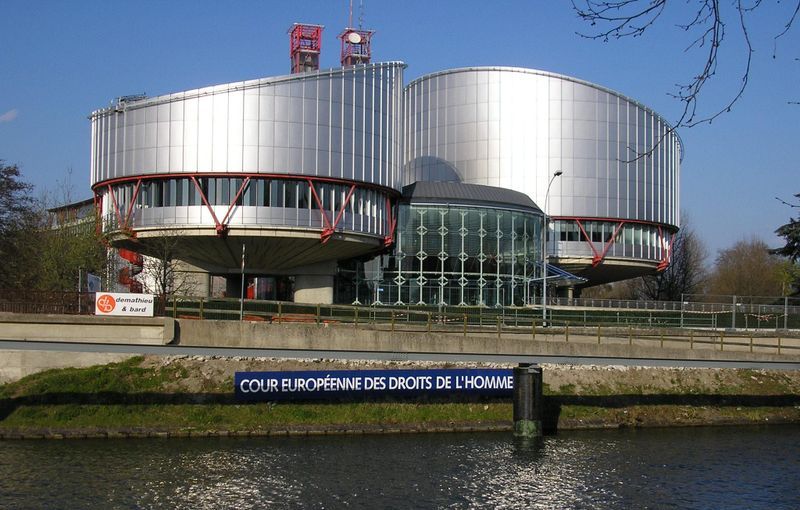 ARAM I’S EFFORTS TO GUIDE THE EUROPEAN COURT OF HUMAN RIGHTS
ARAM I’S EFFORTS TO GUIDE THE EUROPEAN COURT OF HUMAN RIGHTS
Mehmet Oğuzhan TULUN 13.04.2017 -
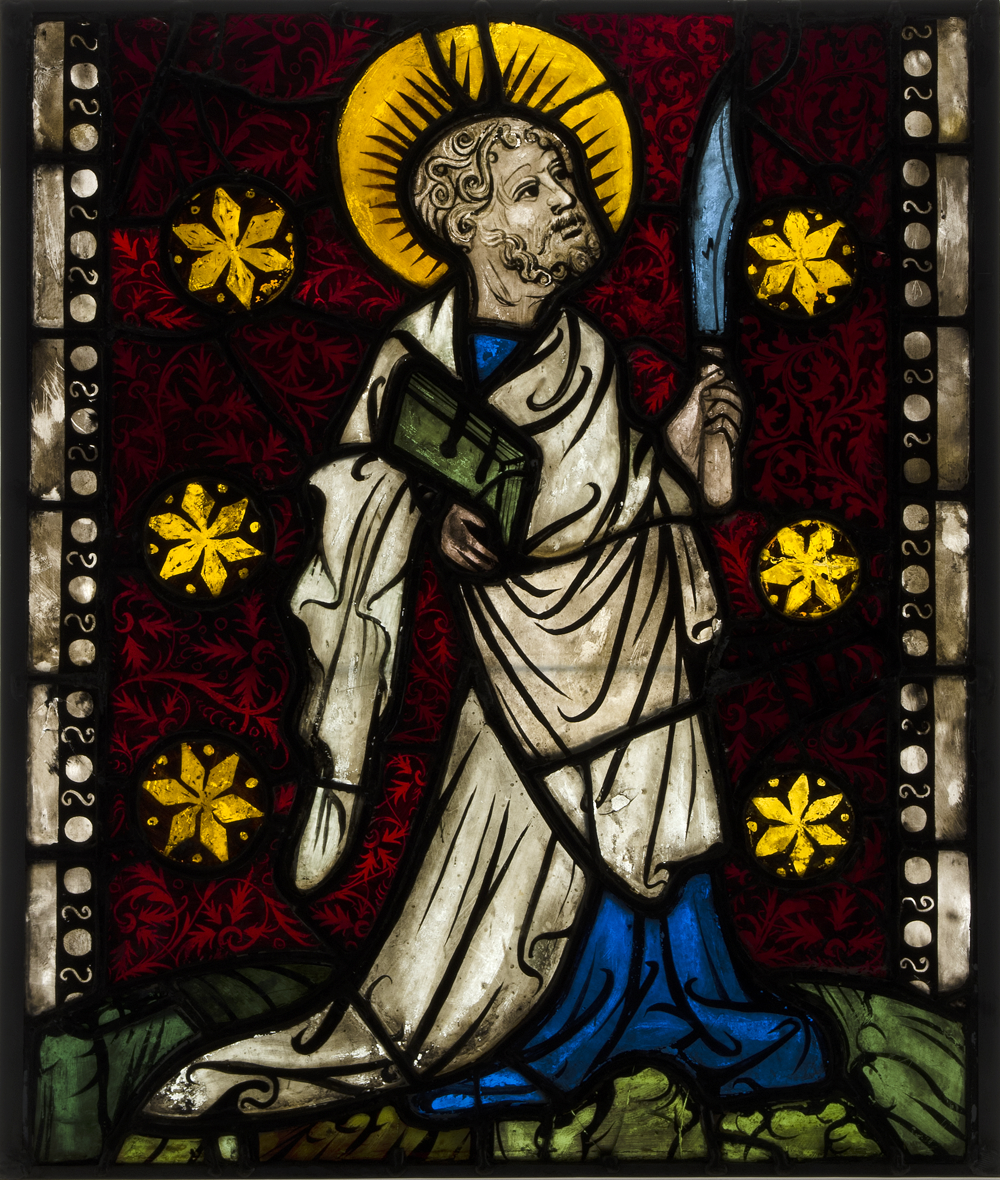 RELIGION AND DOUBLE STANDARDS
RELIGION AND DOUBLE STANDARDS
Mehmet Oğuzhan TULUN 20.04.2016 -
 INTRODUCING RELIGION INTO A LEGAL AND HISTORICAL DISPUTE
INTRODUCING RELIGION INTO A LEGAL AND HISTORICAL DISPUTE
Mehmet Oğuzhan TULUN 12.04.2015 -
A POSITIVE SHIFT IN THE VATICAN’S HISTORICAL NARRATIVE
Mehmet Oğuzhan TULUN 04.02.2016 -
 TÜRKİYE’S SOUTH CAUCASUS POLICY AND THE WEST’S CONFLICTING APPROACH
TÜRKİYE’S SOUTH CAUCASUS POLICY AND THE WEST’S CONFLICTING APPROACH
Mehmet Oğuzhan TULUN 09.01.2025
-
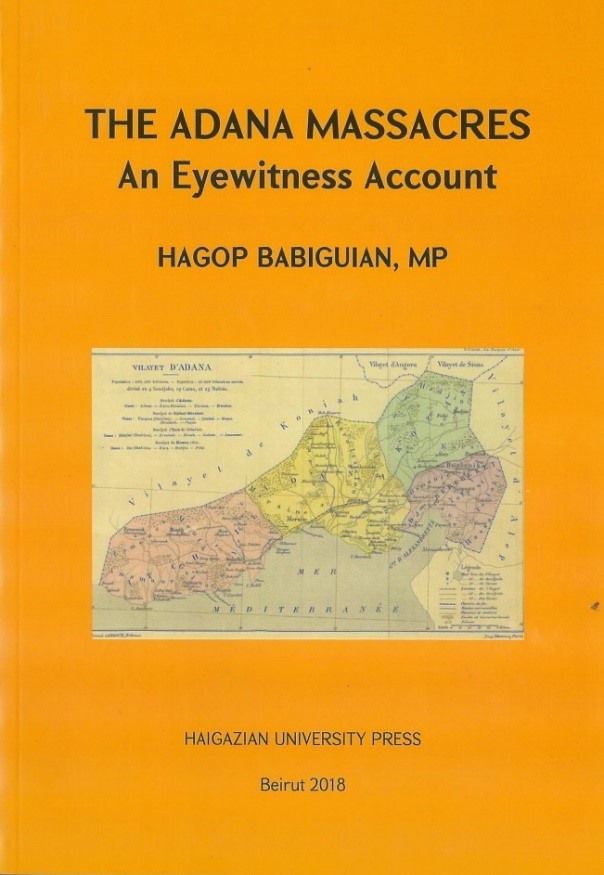 HAGOP BABIKIAN, THE ADANA UPRISING OF 1909, AND THE HAIGAZIAN UNIVERSITY PRESS
HAGOP BABIKIAN, THE ADANA UPRISING OF 1909, AND THE HAIGAZIAN UNIVERSITY PRESS
AVİM 14.07.2021 -
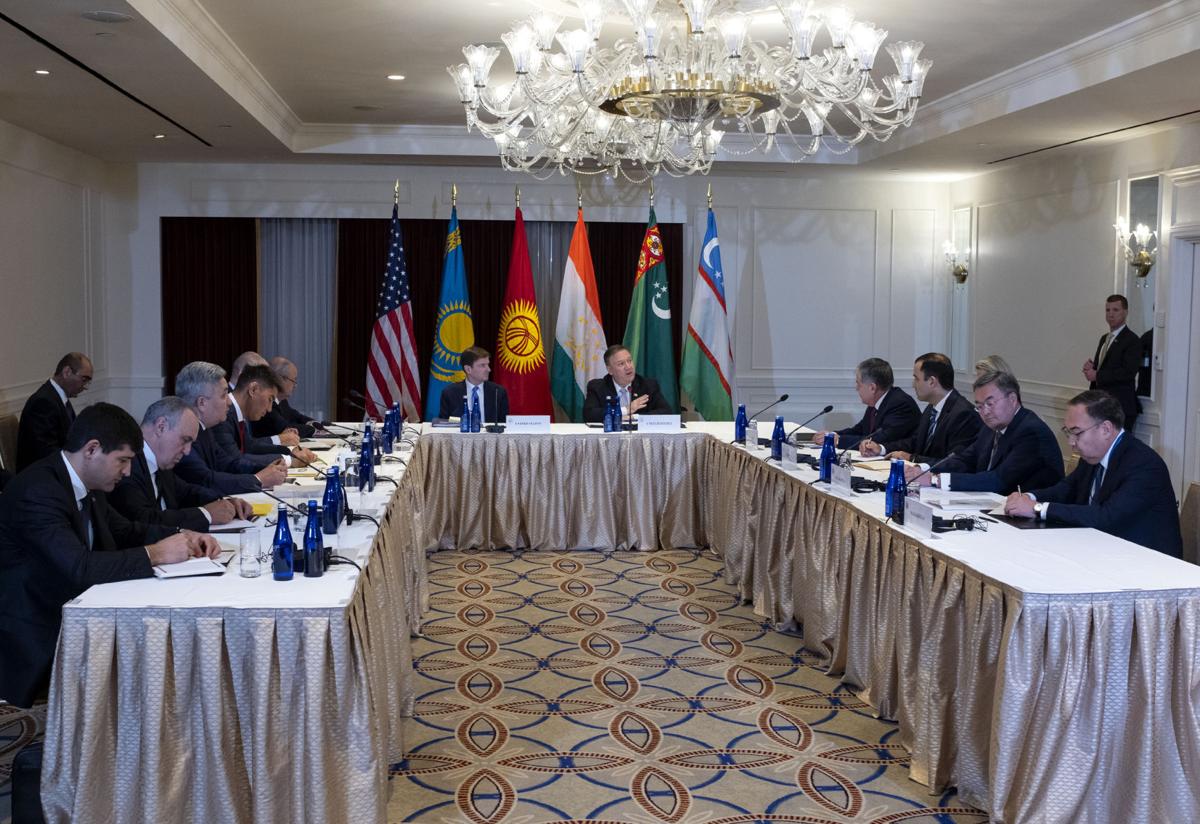 CENTRAL ASIAN COUNTRIES SHOULD OPEN UP TO THE WORLD
CENTRAL ASIAN COUNTRIES SHOULD OPEN UP TO THE WORLD
Ceyda ACİCBE 09.10.2019 -
 SWEDEN BACKTRACKS ON RECOGNITION OF THE KILLINGS OF ARMENIANS, ASSYRIANS/SYRIACS/CHALDEANS AND PONTIC GREEKS AS GENOCIDE
SWEDEN BACKTRACKS ON RECOGNITION OF THE KILLINGS OF ARMENIANS, ASSYRIANS/SYRIACS/CHALDEANS AND PONTIC GREEKS AS GENOCIDE
Cemre Dilay BOZTEPE 17.05.2015 -
THE PROPOSAL TO OPEN THE ARCHIVES TO THE JOINT RESEARCH OF TURKISH, ARMENIAN AND IMPARTIAL SPECIALISTS, SCHOLARS AND HISTORIANS IS STILL VALID
Alev KILIÇ 21.12.2012 -
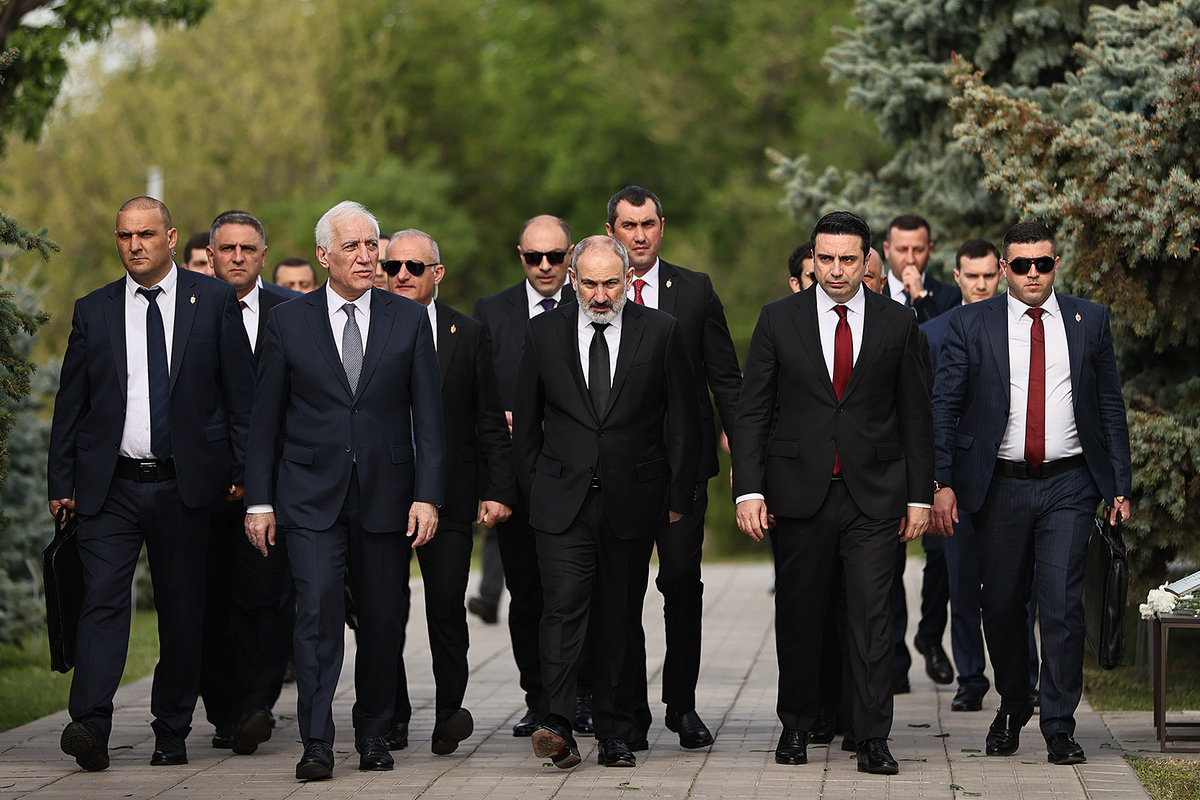 THE EU'S POLICY IS STARTING TO OVERLAP WITH PASHINYAN'S STANCE
THE EU'S POLICY IS STARTING TO OVERLAP WITH PASHINYAN'S STANCE
Hazel ÇAĞAN ELBİR 15.05.2024
-
25.01.2016
THE ARMENIAN QUESTION - BASIC KNOWLEDGE AND DOCUMENTATION -
12.06.2024
THE TRUTH WILL OUT -
27.03.2023
RADİKAL ERMENİ UNSURLARCA GERÇEKLEŞTİRİLEN MEZALİMLER VE VANDALİZM -
17.03.2023
PATRIOTISM PERVERTED -
23.02.2023
MEN ARE LIKE THAT -
03.02.2023
BAKÜ-TİFLİS-CEYHAN BORU HATTININ YAŞANAN TARİHİ -
16.12.2022
INTERNATIONAL SCHOLARS ON THE EVENTS OF 1915 -
07.12.2022
FAKE PHOTOS AND THE ARMENIAN PROPAGANDA -
07.12.2022
ERMENİ PROPAGANDASI VE SAHTE RESİMLER -
01.01.2022
A Letter From Japan - Strategically Mum: The Silence of the Armenians -
01.01.2022
Japonya'dan Bir Mektup - Stratejik Suskunluk: Ermenilerin Sessizliği -
03.06.2020
Anastas Mikoyan: Confessions of an Armenian Bolshevik -
08.04.2020
Sovyet Sonrası Ukrayna’da Devlet, Toplum ve Siyaset - Değişen Dinamikler, Dönüşen Kimlikler -
12.06.2018
Ermeni Sorunuyla İlgili İngiliz Belgeleri (1912-1923) - British Documents on Armenian Question (1912-1923) -
02.12.2016
Turkish-Russian Academics: A Historical Study on the Caucasus -
01.07.2016
Gürcistan'daki Müslüman Topluluklar: Azınlık Hakları, Kimlik, Siyaset -
10.03.2016
Armenian Diaspora: Diaspora, State and the Imagination of the Republic of Armenia -
24.01.2016
ERMENİ SORUNU - TEMEL BİLGİ VE BELGELER (2. BASKI)
-
AVİM Conference Hall 24.01.2023
CONFERENCE TITLED “HUNGARY’S PERSPECTIVES ON THE TURKIC WORLD"









